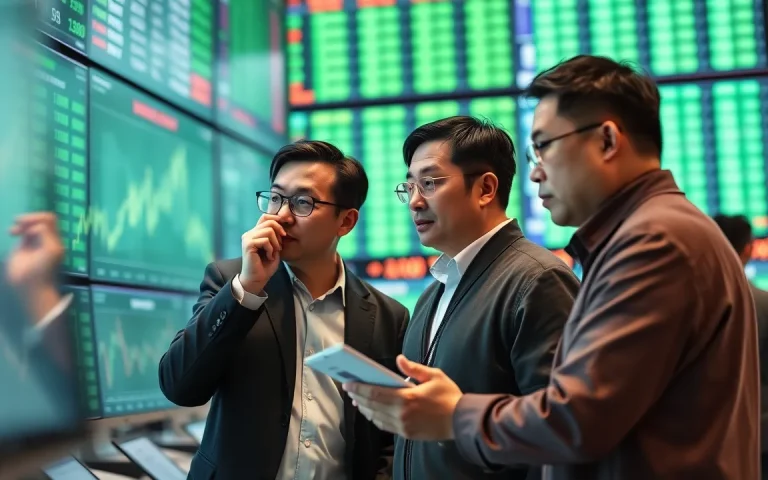A wave of caution swept across most Asia-Pacific financial markets on Friday, with major indices closing predominantly lower.
Investor sentiment was dampened by a confluence of factors, including signs of a slowing US economy, persistent inflation fears, and renewed uncertainties stemming from the dramatic judicial developments surrounding US President Donald Trump’s “reciprocal” tariffs.
Indian benchmarks, including the Sensex, mirrored the regional weakness, finishing the last trading session of May in the red.
The primary driver behind the market downturn was the legal seesaw regarding President Trump’s tariff policy.
Earlier in the week, on Wednesday night, the US Court of International Trade had ruled that Trump had overstepped his authority in imposing his “reciprocal” tariffs and ordered that the challenged tariff orders be vacated.
However, this decision was short-lived. The Trump administration promptly filed a notice of appeal, and by Thursday afternoon, an appeals court had reinstated the levies.
The administration further signaled its intent to escalate the matter, stating it could ask the Supreme Court as early as Friday to pause the federal court’s original ruling if necessary.
Adding to the trade-related anxieties, US Treasury Secretary Scott Bessent, in an interview with Fox News on Thursday local time, acknowledged that trade talks between the US and China were “a bit stalled.”
This admission further clouded the outlook for global trade and contributed to the risk-off mood among investors.
Regional market performance: a sea of red
The negative sentiment was reflected across most major Asian bourses.
Japan’s benchmark Nikkei 225 declined 1.22% to end the day at 37,965.10, while the broader Topix index moved down 0.37% to 2,801.57.
Investors in Tokyo were also parsing a slew of domestic data releases, including a notable rise in Tokyo’s core inflation reading for April.
The data, which captures consumer costs excluding fresh food, climbed 3.6% from a year ago, marking its highest level since January 2023.
In South Korea, the Kospi index dropped 0.84% to close at 2,697.67, while the small-cap Kosdaq fell 0.26% to 734.35.
Mainland Chinese markets also succumbed to the pressure, with the CSI 300 index ending the day 0.48% lower at 3,840.23. Hong Kong’s Hang Seng Index retreated 1.2% to 23,289.77.
One of the few bright spots in the region was Australia’s S&P/ASX 200, which rose 0.3% to end the day at 8,434.70.
Indian markets: Sensex skids as tech, auto, metals drag; GDP data awaited
The Indian stock market wrapped up the final trading session of May in negative territory.
A sharp sell-off in technology, auto, and metal stocks dragged the headline indices lower, reversing a brief rebound seen in the previous session.
While PSU stocks offered some pockets of support, it wasn’t enough to lift the broader market.
Ultimately, the NSE Nifty 50 ended with a cut of 79.90 points, or 0.32%, slipping back below the crucial 24,800 mark to close at 24,753 points.
The BSE Sensex skidded 182 points, or 0.22%, to settle at 81,450 points.
Analysts noted that investors turned cautious ahead of the release of domestic GDP data, which likely contributed to the day’s subdued performance.
US market undercurrents: Futures dip, Wall Street’s uneasy gains
US stock futures also slipped as investors awaited further trade news and fresh inflation data.
Futures tied to the Dow Jones Industrial Average pulled back 22 points, or 0.05%. S&P 500 futures fell 0.07%, while Nasdaq-100 futures were last seen down 0.08%.
This followed a session on Wall Street where all three key benchmarks managed to close higher overnight, though gains were curtailed by caution surrounding the court rulings on Trump’s “reciprocal tariffs”.
The S&P 500 moved up, supported by strong moves in chipmaker Nvidia, ending the day 0.4% higher at 5,912.17, despite climbing as much as 0.9% intraday.
The Nasdaq Composite advanced 0.39% to 19,175.87, also well off its highest intraday gain of 1.5%.
The Dow Jones Industrial Average added 117.03 points, or 0.28%, to finish at 42,215.73.
The post Asian markets close: Nikkei dips 1.22%, Hang Seng -1.2%; Sensex ends 182 pts lower at 81,450 appeared first on Invezz

